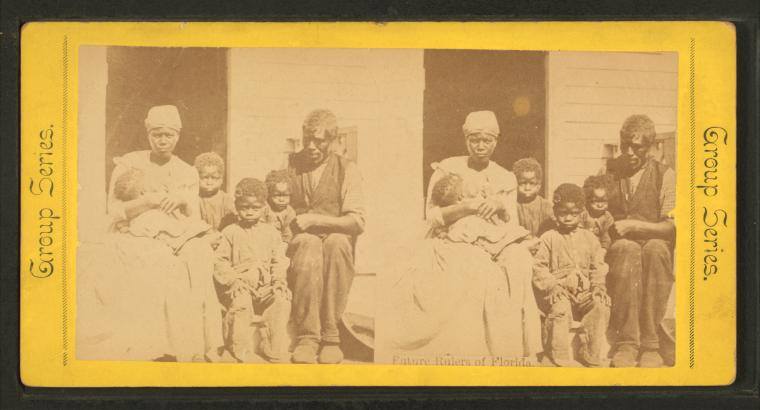Robert E. Lee and William Tecumseh Sherman are hands down two of the most important figures in the American Civil War and American military history.
The irony is that Robert E. Lee, who owned slaves and was the commander of the Confederacy, was in many ways more supportive of improving the lot of emancipated slaves than William Sherman who fought for the Union. Sherman, although born in Ohio, had briefly owned a few slaves when he lived for a short time in Louisiana. Sherman believed that the institution of slavery would survive the war and said that after the war ended he looked forward to owning slaves again.
This, again, only underlines the fact that the primary goal of the North was the preservation of the Union, NOT to emancipate enslaved Africans.
Yet this does not mean that the Civil War was not fought over the issue of slavery.
People forget that a war requires two actors, not one.
And with two different actors both can be fighting for entirely different reasons.
Case in point, was World War II fought to stop Adolph Hitler?
Certainty not from Germany’s point of view.
The Confederacy was formed for the sole purpose of preserving the institution of slavery which wealthy slave owners felt was being threatened by having a sitting President that was on record as calling slavery a “moral evil”.
So anytime someone tells you that the Civil War wasn’t fought over slavery you can respond, well the North wasn’t fighting over slavery but the South most certainly was.
Consider this quote from Jefferson Davis, the President of the Confederacy (1862-1865), “It was only by the existence of negro slavery that the white man is raised to the dignity of a freeman and an equal. Equality among all whites regardless of wealth was possible only because your own menial who blacks your boots, drives your carriage, who wears your livery, and is your own in every sense of the word, is not your equal.”
The South undeniably fought the Civil War over slavery. Clearly, Davis and men like him understood that the enslavement of the African was the ONLY reason they had EVERYTHING that they had.
That is what they thought was at stake.
And the prospect of losing everything was simply too much for some to bear.
In fact, several southern Planters actually committed suicide when the South lost the civil war because they simply couldn’t suffer the thought of existing in a world where they lived on equal plane with freed Africans.
One such person was wealthy Virginia planter Edmund Ruffin, the man who is credited as “firing the first shot of the war” at the Battle of Fort Sumter when the South attacked Fort Sumter, near Charleston, South Carolina starting the American Civil war. On June 18, 1865 he put a rifle muzzle in his mouth and used a forked stick to manipulate the trigger to blow his head off.
Both Lee and Sherman fought for their respective sides out of duty.
Lee, because he felt allegiance to Virginia and Sherman for his allegiance to the United States of America.
We must remember that in 1860 most Americans saw themselves as citizens of their STATE first and their country second, not a distant second, but second nonetheless.
This makes sense if you think about it.
In 1860 most people never left the state where they were born and raised.
Their State was their country.
Had the war been about how you personally felt about slavery, at least from what we know about both of these men, they might’ve switched sides.
After the conclusion of the war, Lee supported the Reconstruction, although he was against giving recently freed slaves the right to vote. But he wasn’t against it because they were black, he was against it because 95% of them were completely illiterate. “My own opinion is that, at this time, they [black Southerners] cannot vote intelligently, and that giving them the [vote] would lead to a great deal of demagogism, and lead to embarrassments in various ways.”
We have every reason to believe that Lee’s opposition to extending the right to vote to recently freed slaves had everything to do with their state of education at the time… being that they had none, because Lee was also on record for supporting providing education for blacks, “blacks should be educated, and … that it would be better for the blacks and for the whites.”
As president of Washington College, Lee repeatedly expelled white students for committing acts of violence against local black men and even successfully lead efforts to establish state funded schools for blacks. Lee even publicly chastised men like Jefferson Davis and Jubal Early who long after losing the war were still interpreting nearly everything that came out of anyone’s mouth from the North as thinly veiled insults towards themselves personally, or towards the South in general.
Have you ever heard of the saying “40 Acres and a Mule”?
Film director Spike Lee even named his film company 40 Acres and a Mule.
Where does it come from and what does it mean?
Actually there was never 40 acres and a mule. The mule part was thrown in as a given. Kinda like a brand new car — and a full tank of gas!
40 acres of land without a beast of burden to help toil the fields would actually be like getting a car with an empty tank of gas. You really aren’t getting very far.
The 40 acres comes from General William T. Sherman’s Special Field Order 15.
Sherman’s army had been laying waste to the south.
Quite literally.
Sherman had just concluded the most destructive, merciless campaign seen in the South throughout the duration of the entire war. Sherman showed no mercy, destroying everything he saw from Atlanta to Savannah; Sherman burned military, industrial, even civilian property down to the ground, bringing the Southern economy to a screeching halt.
Over time, as Sherman lead his path of arson and destruction across Georgia, he accumulated a sizable following, we’re talking tens of thousands of newly emancipated slaves who were following his army wherever Sherman went.
But he was also a realist and eventually Sherman came to realize that just freeing enslaved Africans and then offering them no way whatsoever to be self-sufficient and self-reliant would eventually be a burden on society that would be impossible to bear.
So Sherman met with a group of ministers in Savannah, Georgia, taking a much needed break from setting the state aflame, and listened to their ideas about how best to help the tens of thousands of slaves that were following him throughout Georgia watching everything burn around them.
They all told him the same thing. They needed what every human being needs.
Land.
Land to build a home on for shelter, land to grow food, land to make a living, land to survive.
Sherman agreed. It sounded reasonable enough. So he decided to give land, recently confiscated by his union army, to these recently emancipated slaves. In fact the exact wording was “each family shall have a plot of not more than forty acres of tillable ground.”
See, no mention of a mule, a cow, a horse or any other animal.
So on January 16, 1865 Sherman signed Sherman’s Special Field Orders No. 15, effectively giving 400,000 acres of land that had been confiscated during the war along the Atlantic coast of South Carolina, Georgia, and Florida and dividing it into 40 acre parcels for 18,000 freed slaves living in the area.
Then Lincoln addressed a crowd at the White house on what the post-war South was going to look like, and he suggested that former black soldiers that had fought for the union cause and those few blacks that were educated be granted the right to vote.
That mere suggestion was enough for John Wilkes Booth to say, “that is the last speech he will ever make.”
And then Booth made good on that promise by putting a bullet in the back of Lincoln’s head just three days later.
As for Sherman’s Special Field Orders No. 15, former vice President now President Andrew Johnson, put a kibosh on the whole idea and reversed Sherman’s order, giving the land back to its former Confederate owners.
Possibly because he didn’t want to find a bullet in his own head.
And with that, any and all attempts to “give” former enslaved Africans land so that they could provide for themselves and their families were blocked, if not by former confederates, then Northern investors who were anxious to get their hands on all of that land for their own developments. Northern investors with their eyes on these properties suddenly screamed loudest that Blacks were trying to get special treatment by asking for “handouts” and if they wanted the land they could buy it just like everyone else.
Again, buy it with what money?
The Northern investors quickly swooped in and bought up all of the property and freed blacks were effectively left to the fate that the ministers who met with Sherman had tried to avoid; homeless, unable to provide even the basic necessities for themselves and their families and many, out of necessity, went back to sharecropping for the very slave-owners that they worked for before the civil war.

